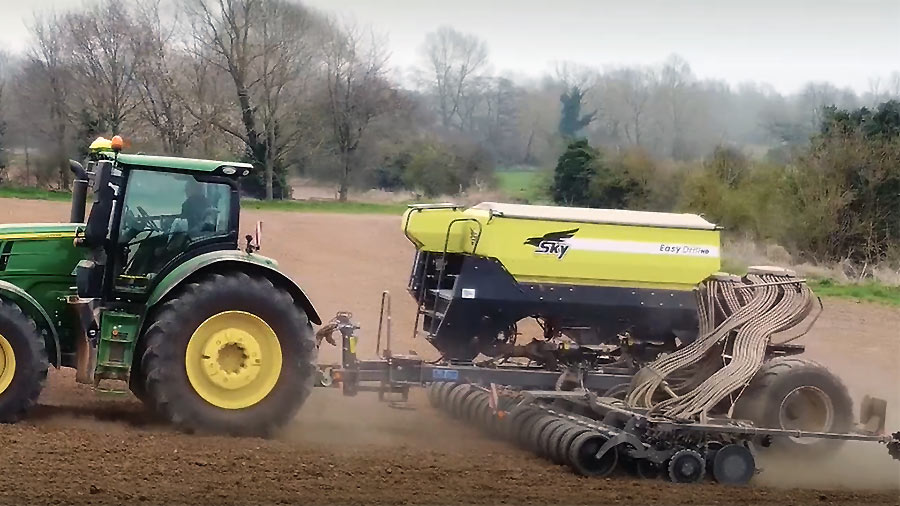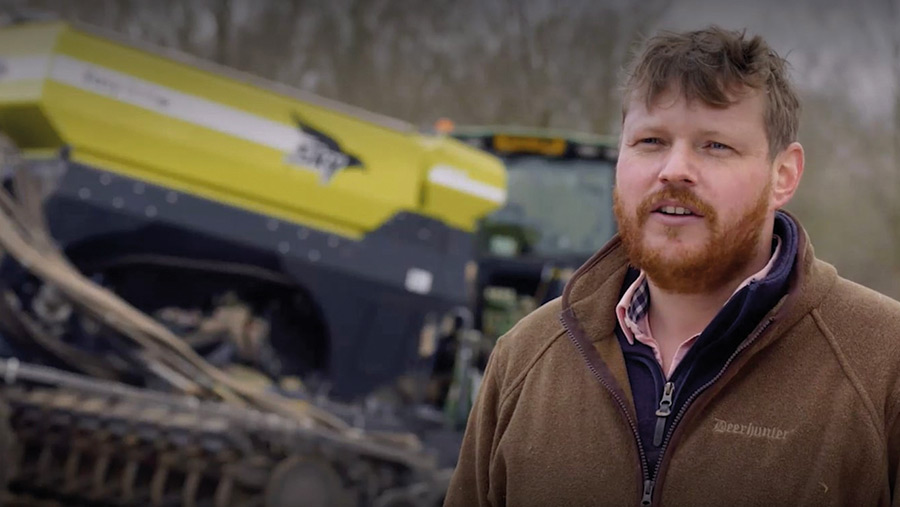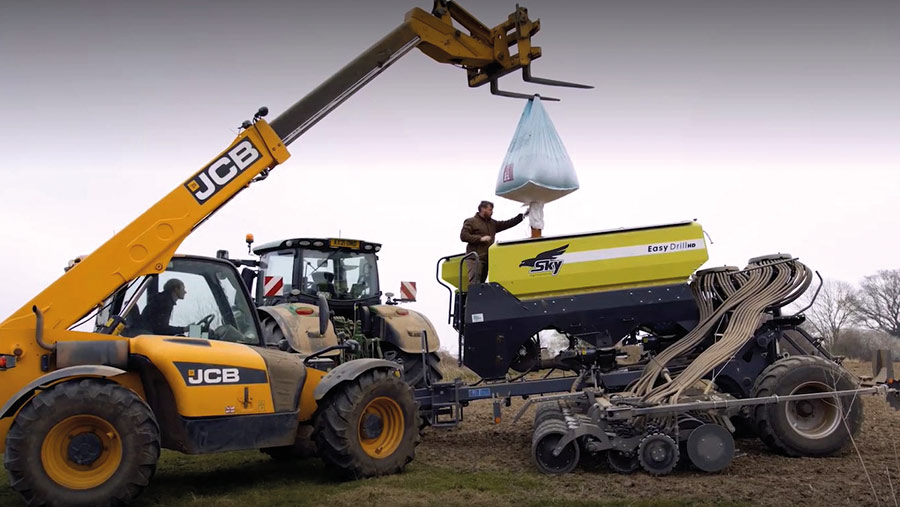Direct drill funding helps farm focus on soil health
 © George Halsall
© George Halsall Making the change to a more regenerative farming system would have been prohibitively expensive for Essex grower George Halsall without the support of Nestlé and its involvement in the Landscape Enterprise Network (LEN) initiative.
Growing cereals, sugar beet and potatoes in the Stour Valley, as well as running a beef suckler herd, he is intent on developing the 330ha family business and preparing it for the future, without taking any unnecessary risks.
Aware of the need to be more sustainable, he had already identified that the greatest barrier to producing crops with less impact on the environment was the cost of the new establishment equipment required, when he heard about LENs through Chilton Grain.
(See “Nestlé joins forces with Anglian Water” below)
See also: Lincs grower moves towards more sustainable spud production

© George Halsall
Having studied the details and noted its support of farmer innovation, Mr Halsall decided to see if it could assist with the purchase of a new drill, which would give him much more flexibility with field work and bring multiple benefits across the rotation.
“Farming along a river means that we are very conscious of water quality, so we are doing everything we can to limit soil erosion, prevent leaching and reduce the risk of flooding,” explains Mr Halsall.
“We also use cover crops for nutrient cycling and to improve soil structure, as well as to avoid having bare ground and soil degradation over the winter,” he adds.
Farm facts
- Location Langham, Essex
- Area 330ha
- Cropping Potatoes, sugar beet, barley, wheat and grassland
- Livestock Beef suckler herd
- Soil Sandy loam
Soil health
With soil health high on his agenda, despite having root crops in the rotation, efforts are being made to decrease the amount of soil movement wherever possible and encourage soil biology.
“It had been clear for a while that having a low-disturbance drill that could be used in a variety of situations, but still get optimum plant establishment, would be a vital part of the system,” he notes.
With the Basic Payment Scheme money reducing and market volatility increasing, Mr Halsall was unwilling to take on more debt or rely on the farm’s cashflow to fund the new direct drill.
Fortunately, his LEN application was successful and he was able to buy a Sky Easy drill.
That purchase will allow him to get cover crops in straight behind the combine, reduce autumn cultivations, establish grass leys and wait until ground conditions are right for drilling, so preventing soil damage.
It also gives him the flexibility he needs for his increasingly diverse rotation, which includes grass, and will be further widened this autumn with the introduction of oilseed rape and winter beans.
Soils in good condition help to produce healthier crops, he comments, making them less reliant on artificial inputs and bringing a biodiversity value to the farm.
Acknowledging that no-till isn’t an option with root crops, he is confident that improvements can be made and risks reduced.
“We’re taking things slowly as we move in the right direction,” he says.
“No one can afford a crop failure in the current high cost climate, so we keep trying things out and adding to our knowledge of what works on this farm.”
E Halsall and Sons is already in the Countryside Stewardship scheme, having started a new Mid Tier agreement last year.
That has enabled the business to fence off 32ha of arable land so that cattle can be outwintered there, reducing costs and workloads.
He has also taken small areas of land out of production, using the winter bird food option AB9.

© George Halsall
Livestock in rotation
In the longer term, Mr Halsall’s plan is to integrate livestock into the rotation by introducing some herbal leys and expanding his area of cover crops, so that they can be grazed by cattle and sheep. The new drill will play a central role in doing this.
He is also bringing more crops and plant types into the system – this autumn will see oilseed rape being grown for the first time at Docuras Farm and winter beans being used as a break crop, with their inherent fertility benefit and very low fertiliser requirement.
“The plan is to have a greater number of crops on smaller areas and to keep moving in the right direction.”
The oilseed rape will be treated as a cover crop initially, so that he can check that it is viable before committing to spend money on it.
If it fails, he will still have the option of establishing a spring crop, using direct-drilling.
“There’s such a huge amount of change taking place in farming and a number of challenges to overcome,” ends Mr Halsall. “If we stand still, there’s a danger that we’ll get left behind.”
He was impressed by the LEN participants’ enthusiasm for his plans and the ease of applying for funding, as well as their understanding of the risks involved in making changes to an established farming system.
Nestlé joins forces with Anglian Water
The world’s largest food company, Nestlé, has teamed up with Anglian Water to provide almost £1m in funding for a landscape initiative in East Anglia, so that farmers can introduce measures that help to protect the environment.
Known as Landscape Enterprise Network (LEN), it has been set up by sustainability consultants 3Keel as an independent mechanism through which businesses with a common interest in protecting the environment can work together.
With an emphasis on regenerative farming, some 32 growers have already benefited from introducing nature-based solutions and new practices, all of which will reduce the impact of food production and halt the decline in biodiversity.
Nestlé, Nestlé Purina Petcare, Nestlé Cereal Partners and Anglian Water are involved, with the first project covering 4,335ha of land in the east of England.
Nestle sources much of its wheat for its cereal and pet food products in East Anglia, which are manufactured at its Staverton and Sudbury plants
The corporate participants believe LEN will help farming to deliver ecosystem services, by connecting buyers of nature-based solutions with land managers who will do the work on the ground.
Among the outcomes anticipated are better water quality and availability, reduced flooding and soil erosion, improved soil health, lower greenhouse gas emissions, more carbon capture and enhanced biodiversity.
The on-farm measures funded by the deal include:
- Cover crops
- Reduced cultivations
- Diverse rotations
- Hedge planting
As Matt Ryan, regeneration lead at Nestlé UK, explains, the idea is to link businesses with farmers to deliver programmes that help with water and air quality, carbon management and biodiversity, so that the landscapes used to produce food are protected.
“It’s about looking at what businesses and landscapes need to thrive,” he remarks.
“East Anglia is an important area for sourcing wheat for both our cereal and pet food products, so we have a mutual goal in reducing our impact on the environment.”
Chris Gerrard of Anglian Water stresses the importance of working together to solve big challenges, while Tom Curtis of 3Keel notes that having a local structure means trades are organised within the regional economy.
He adds that the number of funders has increased from three to six in the past few months, along with a corresponding increase in the number of applications from farmers.

